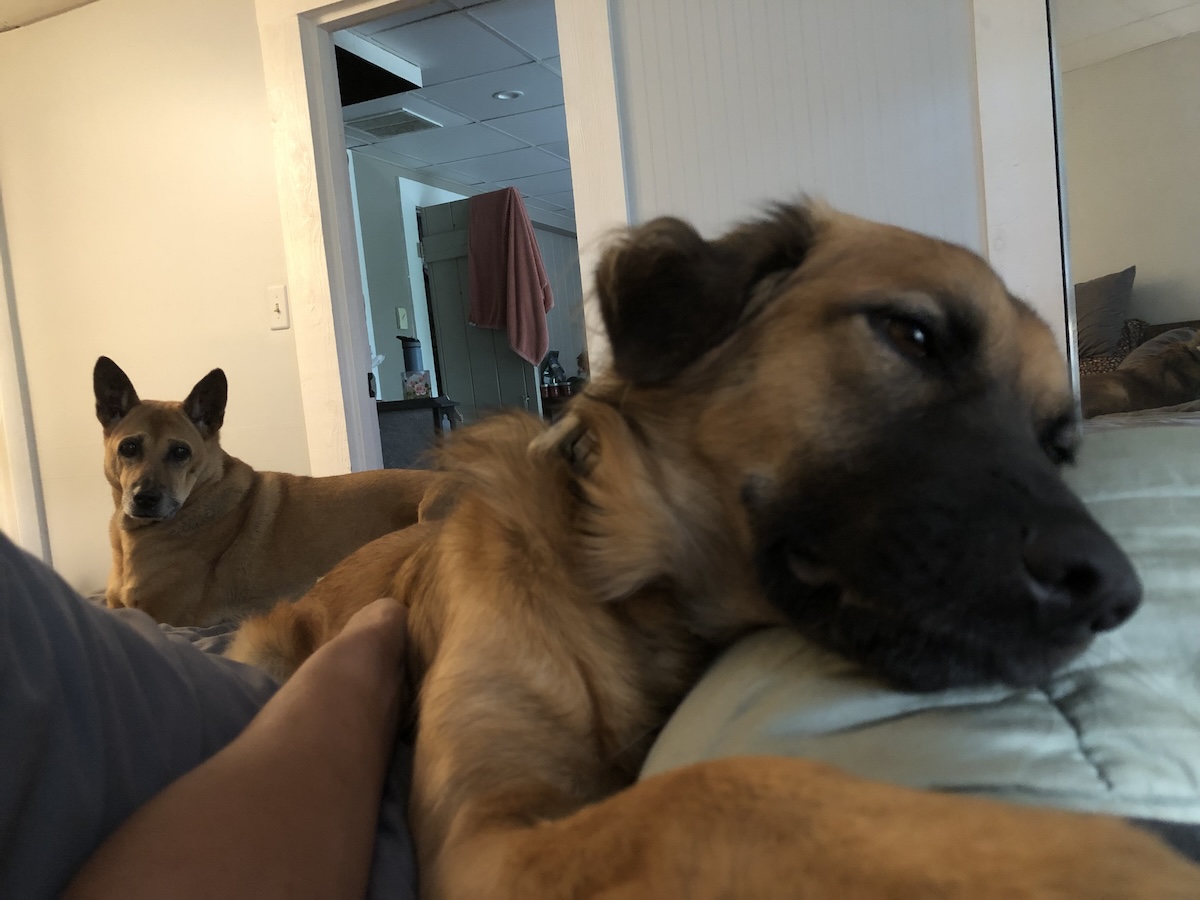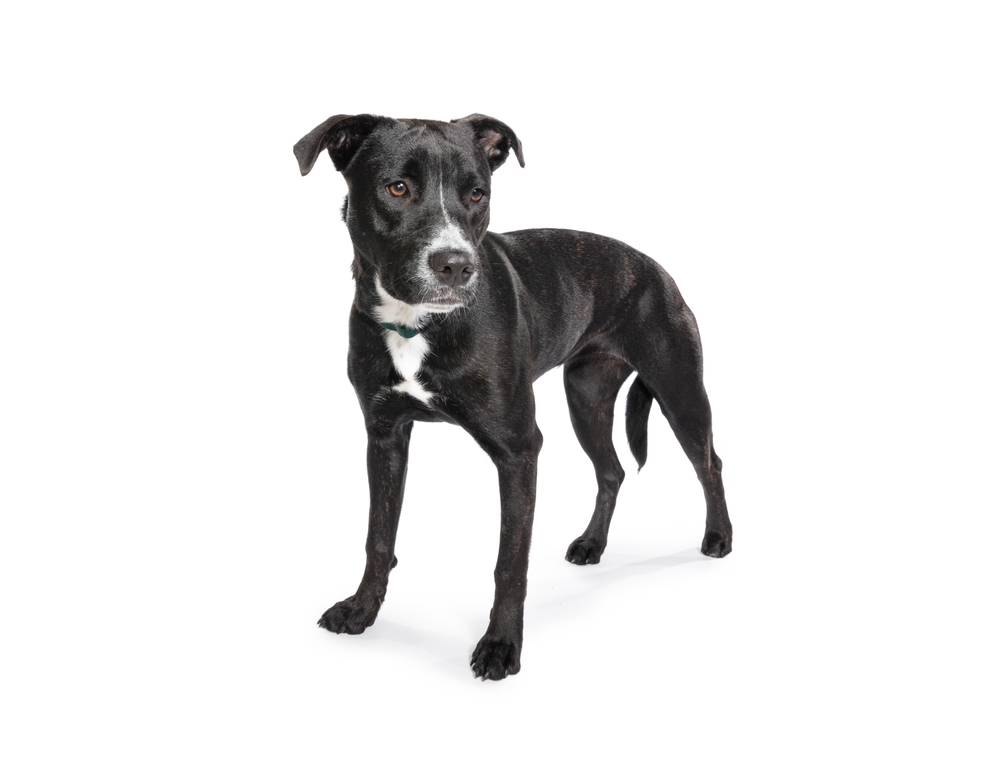Click to Skip Ahead
Headaches are a common ailment for humans, and with no external signs, one that is difficult to measure or quantify. Headaches can happen for a variety of reasons, such as eye strain, dehydration, changes in blood pressure, or stress. As dogs can suffer these conditions as well, it would be reasonable to assume that they would also suffer the headaches that can accompany them.
Studies show that dogs can have headaches and show signs of discomfort in their head. As dogs can’t verbally express that they’re experiencing a headache, it’s up to us to understand normal dog behaviors and look for signs that they may have a headache.
Signs Your Dog May Have a Headache
Dogs can experience headaches of varying intensities. One study even suggests that dogs can also get migraines and show signs and behaviors similar to humans when they experience them 1. Since there aren’t any outwardly physical signs that dogs display when they get a headache, it’s very difficult for veterinarians to diagnose them.
In most cases, you might suspect that your dog has a headache by looking for other signs of pain that your dog may display. These are some common signs that can accompany headaches:
- Lethargy
- Reluctance to move or play
- Nausea
- Sensitivity to bright light
- Shivering or hiding away

Some dogs may also feel extra sensitive about their head or neck being touched when they’re experiencing a headache and won’t want to be petted there. They may also press their head against you as a means of seeking comfort.
Possible Causes of Headaches in Dogs
Headaches can often be caused by an underlying health issue, so they can be a sign of something deeper happening with your dog. For example, dogs may experience headaches caused by dental issues or ear infections. They may also get headaches if they have allergic reactions that affect their sinuses, and can suffer from hayfever in the same way we do.
Head trauma is another possible cause of headaches, and dogs can also experience encephalitis, which is inflammation of the brain. Encephalitis in dogs can be caused by infections from bacteria, viruses, parasites, fungi, and tick-transmitted diseases. More commonly, dogs can also experience idiopathic encephalitis, which is when infections aren’t the culprit.
What to Do If Your Dog Has a Headache
If you suspect that your dog has a headache, you might start by providing similar comfort that can help us feel better, such as:
- A dark, quiet room to rest in
- Plenty of fresh, chilled water
- A gentle head rub, or even a cold washcloth on the head
If their signs are not resolving within 12-24 hours, or if they are getting worse, it is important to schedule an appointment with your veterinarian. Your veterinarian can do a thorough physical exam to see if your dog is in good health or if there may be an underlying health issue. It’ll be helpful for you to give your veterinarian information on any other changes in behavior that have caused you to suspect that something is off with your dog.

Once your veterinarian has completed a thorough physical exam, you’ll receive a treatment plan to help your dog. In some cases, your veterinarian may prescribe pain medication, and you’ll have to monitor your dog’s behavior and condition to determine if the medicine’s working to relieve its headache.
While humans can simply take pain relief medication to alleviate minor headaches, it’s important to never medicate your dog without consulting your vet. Certain over-the-counter medicines can end up making dogs feel worse and others can be extremely dangerous for them.
If your dog’s headache or changes in their behavior continue to persist over time, your veterinarian may run other diagnostic tests, like bloodwork or imaging. These tests will help give further insight into seeing if your dog is suffering from an underlying health issue or disease.
When To Seek Help Right Away
There are certain signs of headache or head pain that should be seen by a vet as a matter of urgency.
- Marked lethargy or very dull, depressed demeanor
- Repeated vomiting
- Head pressing against walls or corners
- Ataxia (wobbly or stumbling when walking)
- Bumping into things
- Severe aversion to light (photosensitivity)
- Walking in circles
- Eyes flickering side to side (nystagmus)
- Very painful head or neck
- Inappetence that lasts more than 24 hours
These signs could indicate serious neurological problems and swift diagnosis and treatment are vital.
Final Thoughts
Headaches in dogs are still a bit of a mystery, and it can be difficult to determine if and when they’re experiencing one. However, it is possible for dogs to get headaches, and you’ll most likely detect them by observing changes in your dog’s behavior.
The more you know your dog, the more familiar you’ll become with what’s normal behavior and what’s not. Any sudden changes in behavior can indicate an underlying health issue. So, if you notice something off about your dog and it persists, make sure to schedule an appointment with your veterinarian to rule out any diseases or illnesses that may be causing these changes.
Remember, if you think something is wrong, you’re probably right, so it’s always better to get them checked.
Featured Image Credit: ALEX_UGALEK, Shutterstock











